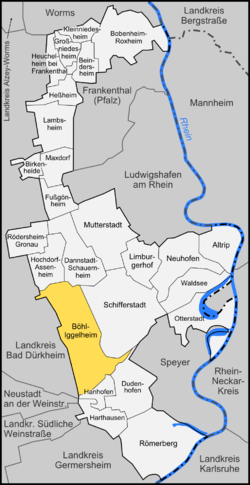Böhl-Iggelheim
| Böhl-Iggelheim | ||
|---|---|---|
| ||
 Böhl-Iggelheim | ||
Location of Böhl-Iggelheim within Rhein-Pfalz-Kreis district  | ||
| Coordinates: 49°23′N 8°18′E / 49.383°N 8.300°ECoordinates: 49°23′N 8°18′E / 49.383°N 8.300°E | ||
| Country | Germany | |
| State | Rhineland-Palatinate | |
| District | Rhein-Pfalz-Kreis | |
| Government | ||
| • Mayor | Peter Christ (CDU) | |
| Area | ||
| • Total | 33 km2 (13 sq mi) | |
| Population (2013-12-31)[1] | ||
| • Total | 10,131 | |
| • Density | 310/km2 (800/sq mi) | |
| Time zone | CET/CEST (UTC+1/+2) | |
| Postal codes | 67459 | |
| Dialling codes | 06324 | |
| Vehicle registration | RP | |
| Website | www.boehl-iggelheim.de | |
Böhl-Iggelheim is a municipality in the Rhein-Pfalz-Kreis, in Rhineland-Palatinate, Germany. It has about 8.200 inhabitants and is situated approximately 15 km southwest of Ludwigshafen, and 10 km northwest of Speyer.
Geography
Böhl-Iggelheim is in the very middle part of the flood plane of the River Rhine and is a typical Lower Palatinate village. The nearest cities are Mannheim and Ludwigshafen in the East and Speyer in the South.
The Niederwiesenweiher, which is a large lake where sand and gravel was excavated for the nearby motorway, lies to the East of Iggelheim. It is used for swimming and angling in Summer and ice skating in Winter when it is really cold. All the way to Speyer (10 km), the road from Iggelheim is surrounded on both sides by forest, within which there are many paths for walkers.
On the border of Böhl you will find 2 new wind turbines, which belong to Meckenheim and Hassloch.
Population
In 1957, Böhl-Iggelheim was formed consisting of an amalgamation of the northern part Böhl and the southern part Iggelheim. Böhl has a population of 3800 and Iggelheim almost 4400 inhabitants.
History
Böhl was founded in the 8th Century as a Frankish village. Iggelheim had been founded about 100 years before as a Christian convent.
Both villages belonged to the realm of the German Kingdom and previously to the Frankish Empire. During the 30 Year's War both villages were burnt down by Spanish and Swedish invaders. From 1797 on, Böhl and Iggelheim belonged to the French and the Palatinate part of Bavaria after which they came under the direction of the new city of Ludwigshafen.
Even today it still belongs to Ludwigshafen and has its area council offices under the name "Rheinpfalzkreis" there.
Politics
The city council is dominated by the CDU, SPD and local parties FWG and BIL. The Mayor Peter Christ is a member of the CDU. There is also a youth council run by local young people.
References
- ↑ "Gemeinden in Deutschland mit Bevölkerung am 31. Dezember 2013". Statistisches Bundesamt (in German). 2014.
External links
- Official Website (German)
|
